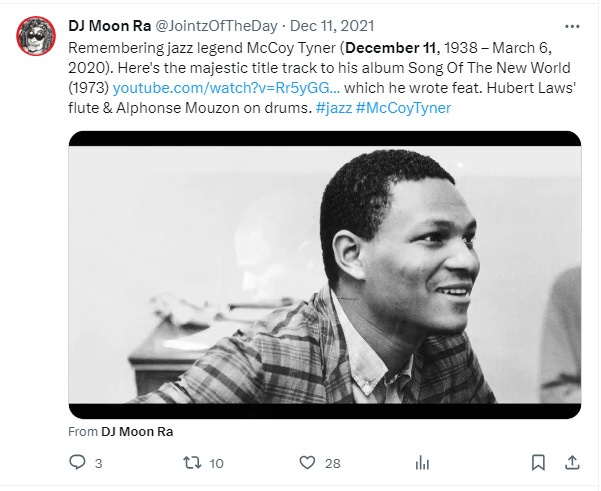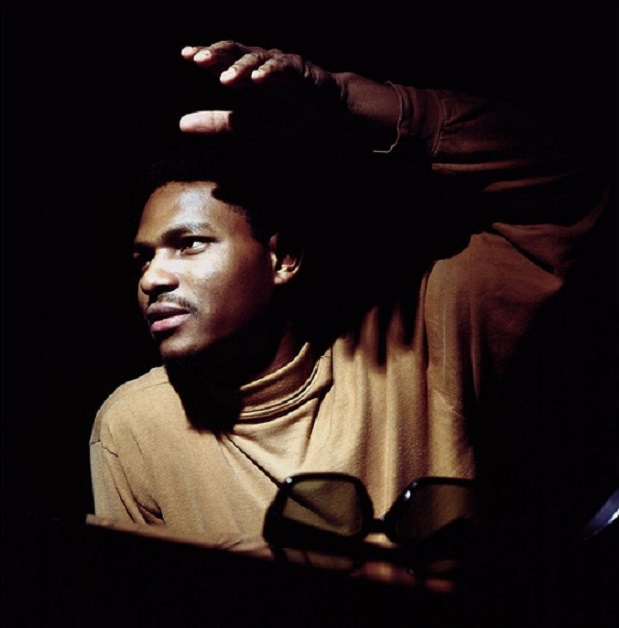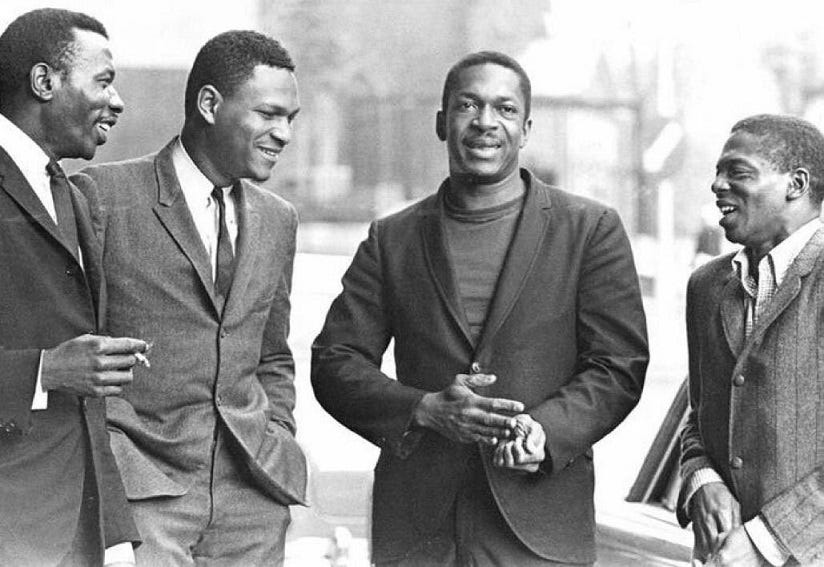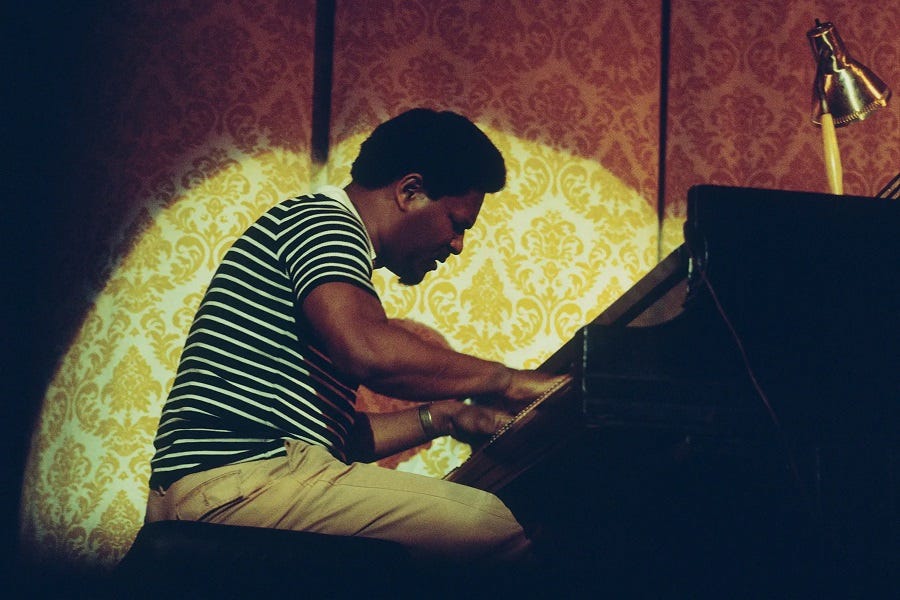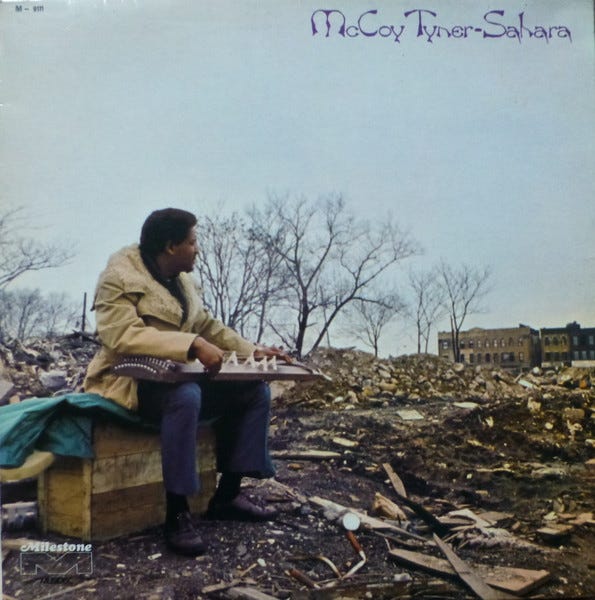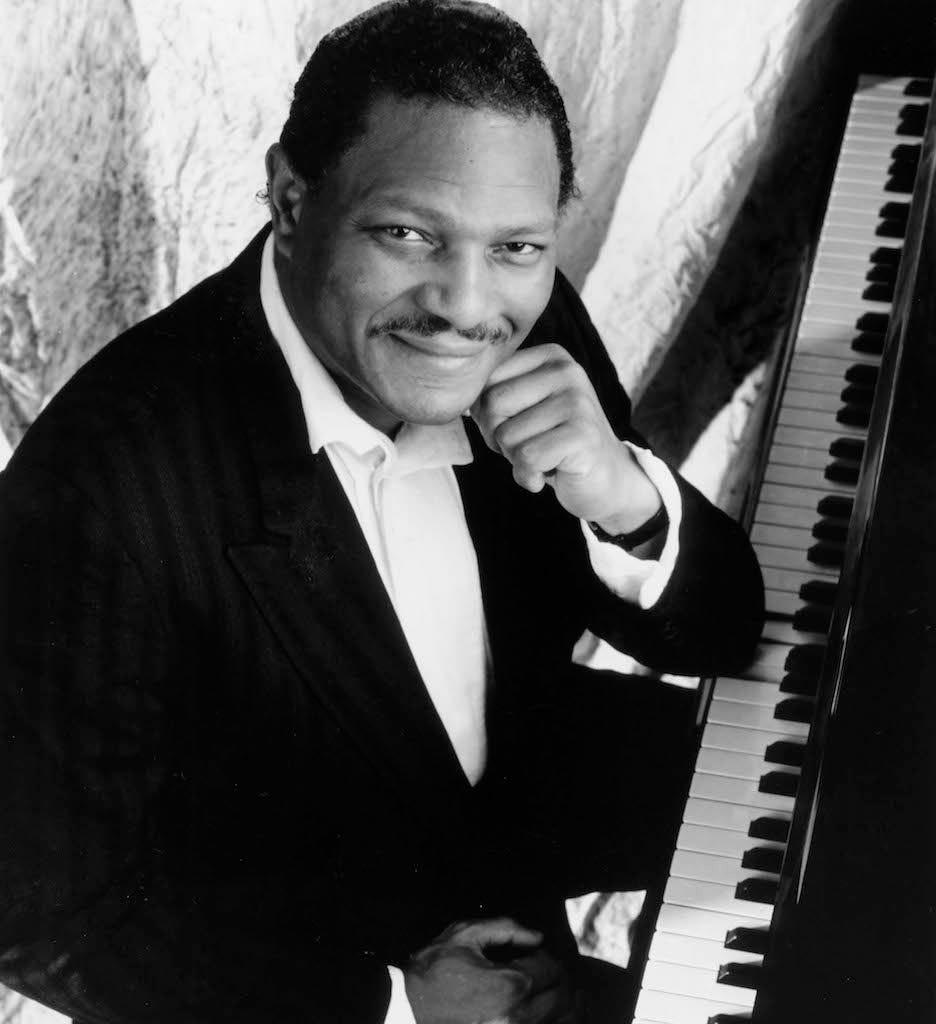McCoy Tyner (December 11, 1938 – March 6, 2020) – Song of the New World (1973)
The legendary Coltrane Quartet pianist wrote this majestic title track to his 1973 solo LP, featuring Hubert Laws on flute and Alphonse Mouzon on drums.
Watch full video on Twitter.
View most updated version of this post on Substack.
Jazz legend McCoy Tyner rose to fame in the early 1960s as the pianist in John Coltrane’s classic quartet, and his powerful sound was highly influential. He remained a giant of jazz for the next five decades, releasing at least 55 solo albums and recording dozens of LP’s with other artists.
Alfred McCoy Tyner was born and raised in Philadelphia. His mother owned a beauty salon, and installed a piano in the shop that she encouraged him to play. At age 13, he began studying at the city’s famed Granoff School of Music. One of his family’s neighbors was jazz pianist Bud Powell, who further inspired Tyner to pursue a career as a professional musician.
He first played around Philly, then moved to New York City and in 1960 joined Art Farmer and Benny Golson’s Jazztet, a sextet they had formed the year before. Tyner spent six months with the group, then joined John Coltrane’s new quartet alongside Elvin Jones on drums and bassist Steven Davis, who was eventually replaced by Reggie Workman and later Jimmy Garrison.
Coltrane had just left Miles Davis’ band for the second and final time, and assembled his own quartet for a summer, 1960 residency at New York's Jazz Gallery. Tyner had been friends with Coltrane for several years, and joined the quartet just in time to take part in their first recording sessions, held in late October at Atlantic Studios in Manhattan. Out of these sessions came the landmark album My Favorite Things, released on Atlantic Records in March, 1961. The title track was a modal jazz reinterpretation of Rodgers and Hammerstein’s song from the hit 1959 musical The Sound Of Music.
Released as a single, it received national airplay, spurring significant album sales. It became Coltrane’s signature song, and he would re-record it with his quartet several times over the next few years. Tyner’s hypnotic, rhythmic piano chords were a central element to “My Favorite Things” along with Coltrane’s solos.
See our earlier post on John Coltrane and his compositions “Big Nick” (1962) and “Alabama” (1963) for more on their collaborations in Coltrane’s quartet.
For an overview of Tyner’s solo work on Blue Note Records immediately after he left the quartet in 1965 (including albums like Expansions (1968) that featured Wayne Shorter on tenor sax, Ron Carter on cello, and Gary Bartz on alto sax bringing life to stellar cuts like “Peresina”), see David Johnson’s excellent 2019 essay “Tyner Time: McCoy Tyner's Blue Note Years.” Also see our earlier post on Tyner’s “Planet X,” recorded on November 22, 1968 but not released on Blue Note until 1976.
In 1971, Blue Note co-founder Francis Wolff died and A&R head Duke Pearson left, who had separately produced six of the seven albums Tyner recorded for the label. Tyner soon signed with Milestone Records, established in New York City in 1966 and owned by Orrin Keepnews and Dick Katz, which in 1972 would be sold to Berkeley, California-based Fantasy Records.
Tyner recorded his twelfth studio LP in January, 1972 at Decca Recording Studio, released the following July as Sahara. Its lineup included Sonny Fortune on sax and flute, bassist Calvin Hill, and Alphonse Mouzon on drums, who was 23 years old at the time.
All the players used multiple instruments, with Tyner playing koto, flute, and percussion in addition to piano. Highlights included its powerful opening cut “Ebony Queen” and its epic 23-minute long title track. Sahara was Tyner’s breakthrough album, selling over 100,000 copies and nominated for two Grammys.
For Tyner’s 1973 album Song of the New World, he wrote the majestic title track, featuring Hubert Laws on piccolo and flute, Joony Booth on bass, Fortune on sax, Mouzon on drums, and a full string section conducted by William Fischer. It was recorded April 6, 1973 at A&R Studios in New York City. The album was released that July on Milestone.
That same month, on July 7, 1973, Tyner’s quartet appeared at the Montreux Jazz Festival in Switzerland, with Booth on bass, Mouzon on drums, and a young Azar Lawrence on tenor sax. Their electrifying performance was recorded for the live double album Enlightenment, released later that year. One of their set’s masterpieces was the superb jam “Walk Spirit, Talk Spirit.”
In 1982, Tyner released his Looking Out LP on Columbia Records, a controversial release many critics thought was one of his weakest albums. It was certainly the closest he ever came to mainstream R&B, and featured the beloved singer Phyllis Hyman who elevated the tracks she sang on. In particular, her vocals soared on the beautiful love song “In Search Of My Heart,” which Tyner wrote, featuring Stanley Clarke on bass, Carlos Santana on guitar, Gary Bartz on alto sax, Jerry González on percussion, and Buddy Williams on drums.
Happy Cosmic 85th Birthday to the great McCoy Tyner.
Further info:
“Tyner Time: McCoy Tyner's Blue Note Years,” by David Johnson, Nightlights, Indiana Public Media, November 4, 2019.
“McCoy Tyner, Groundbreaking Pianist Of 20th Century, Dies at 81,” obituary, NPR, March 6, 2020.
“McCoy Tyner, Jazz Piano Powerhouse, Is Dead at 81,” obituary, The New York Times, March 7, 2020.
“On the Timeless Music of McCoy Tyner,” The Paris Review, March 9, 2020.
“Remembering McCoy Tyner, A Jazz Legend Who Created His Own Style,” NPR, March 10, 2020.
#jazz #Coltrane #McCoyTyner




